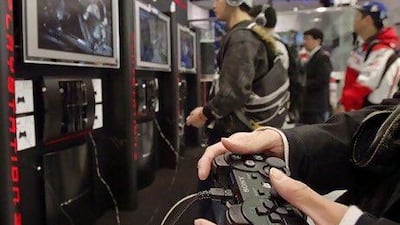Sony is investigating how many of its more than 500,000 Middle East gamers have had their names, e-mail addresses, login passwords and possibly credit card details stolen by hackers.
Globally, about 77 million gamers have fallen victim to the intrusion, which is believed to be one of the largest privacy attacks to date.
Sony's PlayStation Network, which offers online games, movies and TV shows, was attacked between April 17 and April 19, the company said yesterday. On April 20, it closed the network because of the intrusion.
The company said it could not rule out that credit card details had also been taken and urged customers to check their bills.
Informa Telecoms & Media estimates there are 600,000 users of the PlayStation Network in the Middle East, with the PlayStation 3 the region's most popular current generation console.
Tim Stokes, the sales and marketing director for PlayStation Sony Gulf, would not confirm the number of users affected, but said the company was calculating a breakdown of global network users.
"The network has now been down nearly seven days, so we want it back online as soon as possible in a way that it's not going to be compromised," Mr Stokes said. "We cannot rule out the possibility that credit card data was stolen."
The hackers accessed user-provided names, e-mail addresses, birth dates, log-in information and purchase history.
Mr Stokes said Sony had consultants working around the clock to get the system back up and running, but could not confirm a date for a relaunch.
Matthew Reed, a senior research analyst with Informa, said the breach and Sony's delay in informing network users would not cast the electronics giant in "a positive light".
"The important thing for Sony is how it deals with the problem, whether it communicates effectively with people involved, which might include regulators," said Mr Reed.
Sony said it had combined PlayStation Network customer data with Qriocity, which offers movies or music in 11 nations on web-connected Bravia TVs and Blu-ray players, and that this system had also been compromised.
"There is not a high propensity for people in the Middle East to put their details online," Mr Stokes said. "I'm sure that consumers' confidence will be knocked, but we have to reassure them that when the network is back online that it's a secure environment."
The news follows a breach at Epsilon Data Management in the US last month, in which customer data at a number of US banks and retailers was stolen.
The European Commission and National Aeronautics and Space Administration have also both recently announced breaches in cyber-security.
Justin Doo, the security practice director for emerging markets at Symantec, believes a high-profile security breach such as Sony's makes a compelling case for greater vigilance.
"We do not have details of such breaches made public in the Middle East very often," Mr Doo said. "If a by-product of this is that people learn to be more aware, then it's positive."
Video gaming is big business globally, with the market set to grow to US$86.8 billion (Dh318.81bn) by 2014 from $52.5bn in 2009, according to the PricewaterhouseCoopers Global Entertainment & Media Outlook report. In Europe, the Middle East and Africa, the market was worth $18.1bn in 2008 - a figure set to rise to $25.3bn by 2013.
"We are seeing a trend where consumers are often coming up against these unwelcome surprises to do with companies and services that they trust and integrate into their lives," Mr Reed said. "Companies need to be aware that their relationship with the customer can be quite fragile, the customer's behaviour can quickly change."

